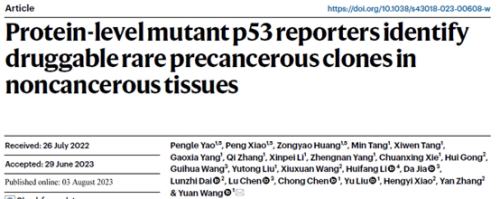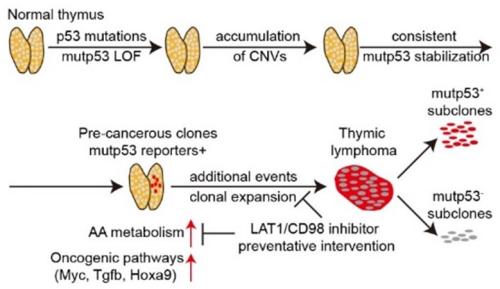Yuan Wang's research team from the Department of Neurosurgery, State Key Laboratory of Biotherapy and Cancer Center (SKLB), West China Hospital published a research paper entitled "Protein Level Mutant p53 Reporters Identify Druggable Rare Precancerous Clones in Noncancerous Tissues" in Nature Cancer on August 3. The first authors of the paper are Dr. Pengle Yao, an assistant research fellow/postdoctoral fellow of West China Hospital, Dr. Peng Xiao and Dr. Zongyao Huang of the State Key Laboratory of Biotherapy. The Department of Neurosurgery of SKLB is the work unit of both the first authors and corresponding author.

“Detecting and targeting precancerous cells in noncancerous tissues is a major challenge for cancer prevention. Massive stabilization of mutant p53 (mutp53) proteins is a cancer-specific event that could potentially mark precancerous cells, yet in vivo protein-level mutp53 reporters are lacking. Here we developed two transgenic protein-level mutp53 reporters, p53R172H–Akaluc and p53–mCherry, that faithfully mimic the dynamics and function of mutp53 proteins in vivo. Using these reporters, we identified and traced rare precancerous clones in deep noncancerous tissues in various cancer models. In classic mutp53-driven thymic lymphoma models, we found that precancerous clones exhibit broad chromosome number variations, upregulate precancerous stage-specific genes such asYbx3and enhance amino acid transport and metabolism. Inhibiting amino acid transporters downstream of Ybx3 at the early but not late stage effectively suppresses tumorigenesis and prolongs survival. Together, these protein-level mutp53 reporters reveal undercharacterized features and vulnerabilities of precancerous cells during early tumorigenesis, paving the way for precision cancer prevention.” (Abstract)

Fig.1 Schematic diagram of model construction
The researchers focus on exploring the research paradigm of the classic mutp53 model - malignant lymphoma (Figure 2). Through flow cytometry, single cell transcriptome analysis, and clone analysis, they found that pre cancer cells with high accumulation of mutp53 exhibit unique genomic and transcriptome characteristics, and significantly upregulate oncogenes and pathways such as amino acid transport and metabolism. The amino acid transport inhibitor JPH203, which has entered Phase I clinical practice, can be employed to target precancerous cells in the early stage, thus effectively preventing the occurrence of malignant lymphoma.

Fig. 2 Pattern diagram of early tumor progression
In summary, this study created mutp53 fluorescent fusion protein reporter gene mice and established various immune normal mouse tumor development models. Through visualization of mutp53 molecular function, low abundance precancerous cells were labeled, traced, and targeted in multiple organ pathological normal tissues, providing an important tool for understanding the evolution and regulatory mechanisms of the early stages of tumor development.
Carried out completely at West China Hospital, this work was supported by the National Key Research and Development Program of China, Stem Cell and Translational Research (2022YFA1105200 to Y.W.), the National Natural Science Foundation of China (82273117 to Y.W., 32000554 to P.Y. and 82173179 to Y.Z.), the Distinguished Young Scientists Program of Sichuan Province (2019JDJQ0029 to Y.W.) and the West China Hospital of Sichuan University under awards from the 1·3·5 project for disciplines of excellence (ZYYC20019 to Y.W.).
By means of innovative tumor models, combining single cell and spatial multi omics analysis, the Yuan Wang team has studied the occurrence and development mechanisms of solid tumors such as malignant brain tumors, lymphoma, and ovarian cancer, exploring new strategies for early diagnosis and prevention of tumors. In the past five years, they have published papers as corresponding authors (including co authors) in Nature Cancer, Cell Research, Nature Communications, Science Advances,and so forth.
SOURCE: https://doi.org/10.1038/s43018-023-00608-w
